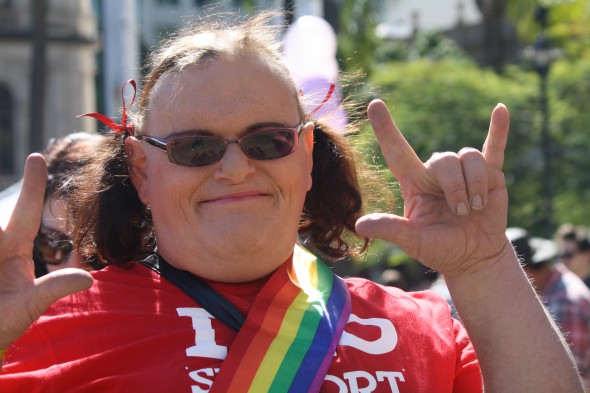Transsexuals, marriage and their rights
Will transsexuals be forced to divorce if they decide to have sexual reassignment surgery?
Rachel was a ‘woman’ that I met at the Rally for Marriage Equality in August this year. She explained to me that she was born a man, but truly believed that she was meant to be a woman.
Rachel also told me about her wife, a woman whom she’d been married to for over 20 years and had accepted her unique life position from day one. She said they were incredibly in love, and as far as her wife was concerned, Rachel was a woman.
When I asked Rachel why she hadn’t taken the next step, and had the operation to remove her male genitals and legally become a woman, she flared up.
“If I have an operation, and I change my gender marker,” she said, “I’ve got to divorce. That’s in the law and its Australia wide and it stinks. And that’s another reason why I support marriage equality.”
After leaving the rally, I’d seen many unique people, viewed lots of different kinds of couples and heard lots of amazing stories. But Rachel’s story really stuck in my head. Surely, there is more to the legislation than that? There has to be loopholes, ways around it. These people have been married for over 20 years. How could their marriage be instantly dissolved if Rachel was to legally become a woman?
So, I contacted the Attorney-General’s office. I looked up the legislation. I spoke to an organisation that works with people with gender issues. And I’m happy to say to Rachel that she is wrong, but only on a minute technicality: the word legal.
So far, in Australia, same sex partners cannot be legally married. Which also means that pre-operative transsexuals, like Rachel, cannot marry a person who is the same sex as them. But, if said person is post-operative, and has had their birth certificate and other documentation amended, there is no issue as the government legally recognises their new sex.
However, if the person is pre-operative, they can marry as long as the person they are marrying is of the opposite sex.
All this comes from a case called Re Kevin, which was brought before the Family Court in 2002. Kevin was born a female. Over the course of his life, he transitioned himself to become male, and had the gender reassignment surgery to remove his female reproductive organs, which were then replaced with male genitals. Later in his life, he met Jennifer, and they decided to be married.
However, the courts denied them the opportunity because Kevin was born a woman. They took their case to the Family Court and won. As a result of this, Re Kevin became the precedence for the new legislation. The Attorney-General’s office says this of the law:
“The decision of the Full Family Court to uphold the original decision does not affect the definition of marriage in Australia as ‘…the union of a man and a woman to the exclusion of all others voluntarily entered into for life’. The parties to a valid marriage must be a man and a woman. The issue in this case was the status to be assigned to ‘Kevin’ who had undergone sexual reassignment surgery and who had been issued with a new birth certificate reflecting his gender as a male. The decision is only applicable to post-operative transsexuals.”
The Gender Centre is an initiative of the Department of Human Services, and is supported by the N.S.W Health Department. Kathryn Cummings, who is the information officer for the Gender Centre was able to clarify a few things for me, and this is where Rachel comes back into the situation. According to Miss Cummings, “a person who is in a legally binding opposite sex marriage may have the gender reassignment surgery to become the same sex as their husband or wife. They are allowed to stay married on the provision that the transsexual who has had the operation does not apply for new documentation to change their gender of their birth certificate”.
Now, obviously this does cause issues in regards to things like passports and driver’s licenses, but I guess one would have to weigh up what was more important to them at the time. However, Miss Cummings was also kind enough to inform me of many a case where people have appealed their rights to be allowed such small luxuries, and applauded former Foreign Minister Kevin Rudd for changing the legislation. Mr Rudd declared that if you are a post-operative transsexual who has not, for whatever reasons, changed their gender marker on their birth certificate, you can get a letter from a medical practitioner stating that you are physically of your new gender, and you will be allowed a passport in your new gender, despite what is on your birth certificate.
So I say to Rachel: you might be in luck. The law is all about give and take, and maybe one day you’ll be allowed all the same things as opposite sex couples. But until that day, there are things you can do, and ways you can fight. As long as you’re willing to be physically a woman but legally a man, you have options. But if you decide this isn’t enough, then you can fight for the day you’re allowed what you want, and be an inspiration to those who are struggling with this too.

